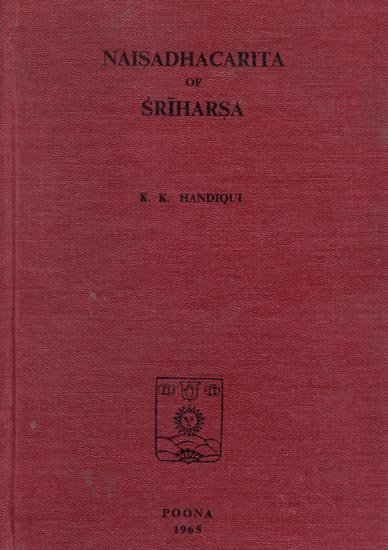Naishadha-charita of Shriharsha
by Krishna Kanta Handiqui | 1956 | 159,632 words
This page relates Introduction to Jinaraja’s commentary of the English translation of the Naishadha-charita of Shriharsha, dealing with the famous story of Nala (king of Nishadha) and Damayanti (daughter of Bhima, king of Vidarbha), which also occurs in the Mahabharata. The Naishadhacharita is considered as one of the five major epic poems (mahakavya) in Sanskrit literature.
Introduction to Jinarāja’s commentary
A number of extracts from the commentary of Jinarāja has been given in the Notes from Ms. No. 452 of 1895-1902 belonging to the collection in the Bhandarkar Institute. The manuscript which contains both Text and commentary is correct and well-written on thin paper, but unfortunately some of the earlier folios are worm-eaten, and some of the leaves have stuck together so tightly that it is often difficult to detach them. The manuscript was written in Saṃvat 1788 or 1732 a.d., as stated at the end of Canto XVI. The Śāka date 1653 is also mentioned.
The commentary of Jinarāja is not very old, as under 3.4 he quotes the Manoramā of Bhaṭṭoji Dīkṣita who is assigned to about 1630 a.d.[1] At the same time Jinarāja must be regarded as earlier than 1676, as in the manuscript of Vidyādhara’s commentary written in the latter year, Jinarāja’s gloss on Naiṣadha 17.196, 197 is found quoted.[2] It is, therefore, fairly certain that Jinarāja lived about 1650 a.d. He was a Jaina as suggested by his name, and the bulk of his quotations is from the grammar and the lexicon of the great Jaina savant Hemacanḍra. Under 16.20 Jinarāja quotes a lexicographer named Śrīdhara.[3] Under 16.119 he criticises a statement of Vardhamānamiśra, the author of Khaṇḍanaprakāśa, a commentary on Śrīharṣa’s Khaṇḍanakhaṇḍakhādya.[4]
Jinarāja’s commentary is known as Sukhāvabodhā and largely modelled on that of Nārāyaṇa, which it often supplements and amplifies. But in his readings Jinarāja almost always follows the earlier commentaries of Cāṇḍūpaṇḍita and Vidyādhara. Besides, he sometimes copies Vidyādhara, for example, in the gloss on Naiṣadha 7.44[5] and 14. 58. Under 10.76 he quotes Vidyādhara’s interpretation of the last two lines,[6] word for word, and remarks “kecitta......... iti vyācakṣāsuḥ”.
The commentary does not systematically follow the accompanying Text found in the manuscript, but the Text is also important as generally agreeing with the earlier readings followed by Cāṇḍūpaṇḍita and Vidyādhara. Where Text and Commentary do not agree I have often designated the former as Jina (Text).
Jinarāja’s commentary is an elaborate work, and has distinct merits of its own. The commentary is well-preserved in the above manuscript, though it contains a few gaps.[7] As a commentator Jinarāja belongs to the school of Nārāyaṇa, whom he generally follows in the matter of interpretation. But the real importance of Jinarāja’s commentary lies in the fact that he follows a Text older than that followed by Nārāyaṇa, Mallinātha and others, and preserves to a considerable extent the continuity of the earlier and more reliable readings of Cāṇḍūpaṇḍita and Vidyādhara. It is, however, noteworthy that in a few cases Jinarāja criticises and rejects the readings of the two earlier commentators, though he does not mention them by name.[8]
Footnotes and references:
[2]:
See Notes 17. 196.
[3]:
See Notes. Śrīdhara is quoted in the Purusakāra commentary on the Daiva. The Purusakāra has been assigned to the thirteenth century (see Introduction to Trivandrum ed.). According to Aufrecht, Śrīdhara is frequently quoted in Sundaragani’s Dhāturatnākara.
[4]:
The passage in question has been cited by Pandit Śivadatta in a Footnote to his edition. Vardhamāna is also the author of the well-known Kusumāñjaliprakāśa and has been assigned to the first quarter of the fourteenth century. See G. N. Kaviraj in Sarasvati Bhavan Studies, Vol. III, p. 134.
[5]:
See Notes.
[6]:
See Notes.
[7]:
These cover a portion of Canto XVIII and the last few verses of Canto XXII.
[8]:
See Notes 2.92, 93; 3.135.
